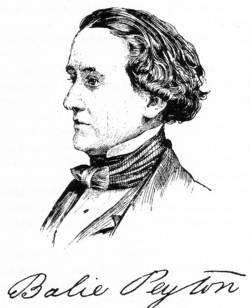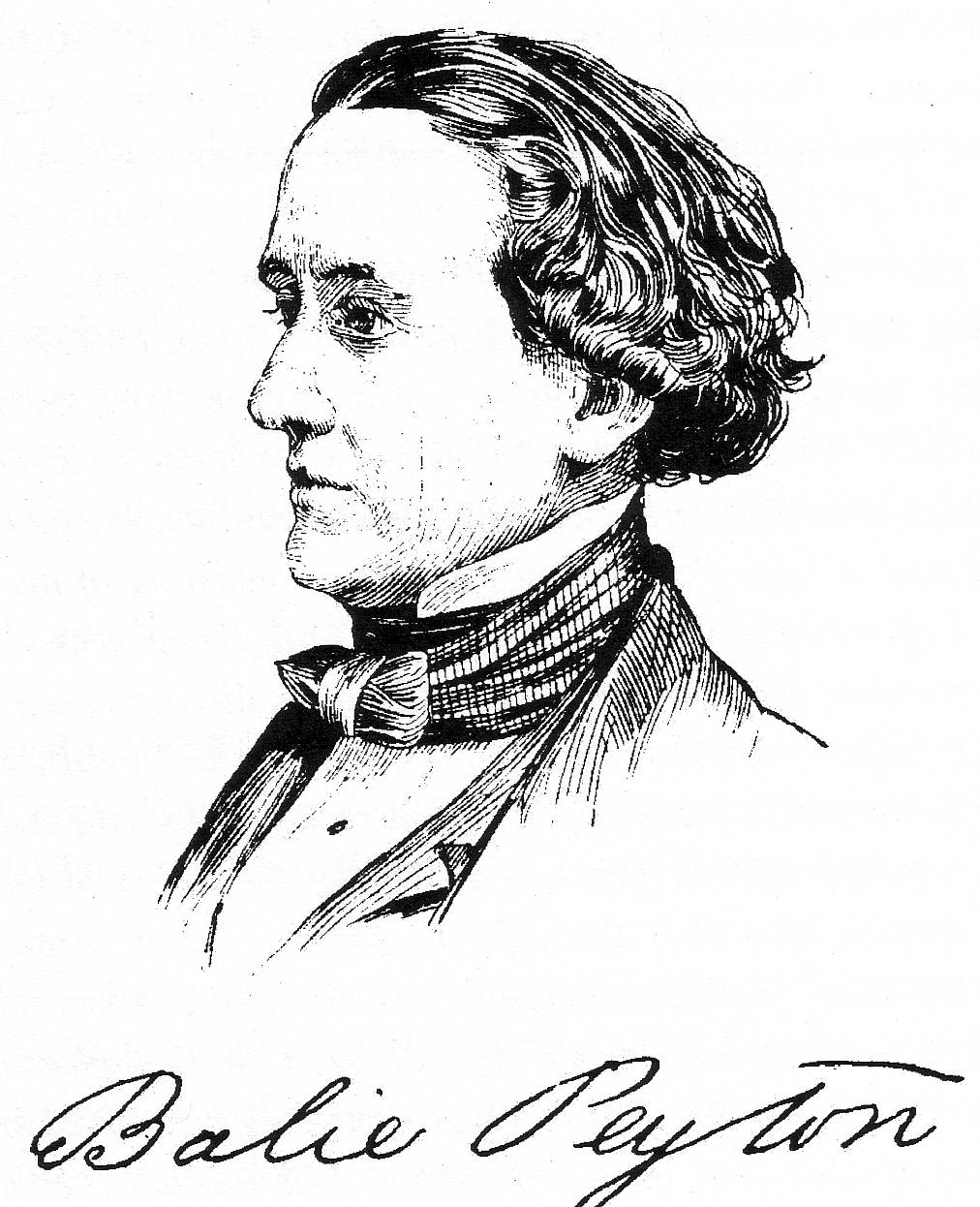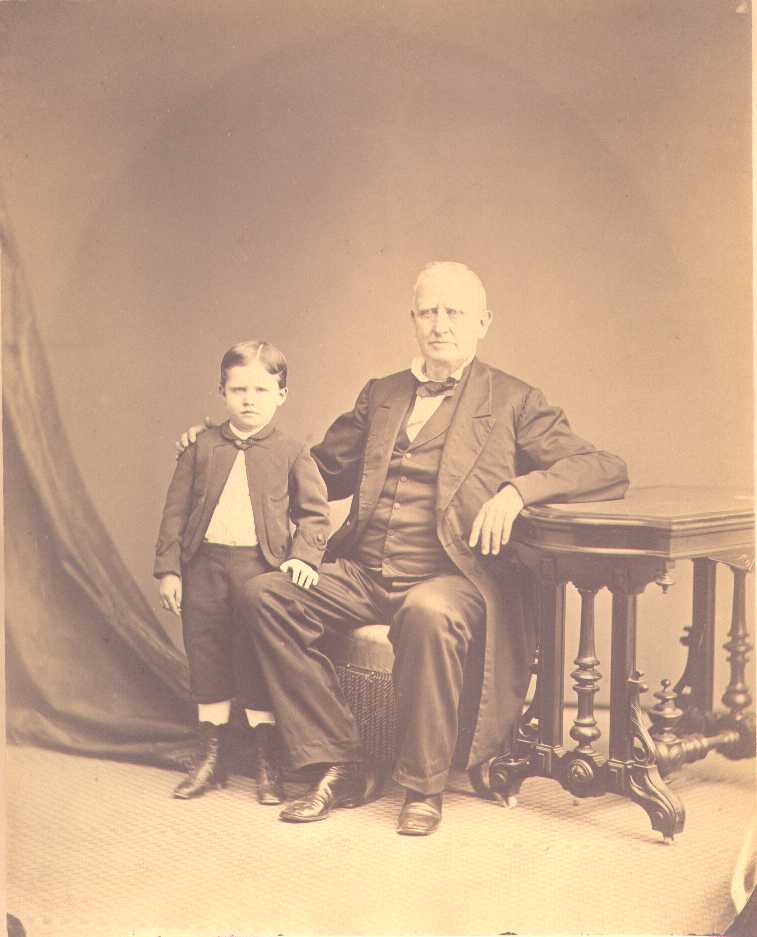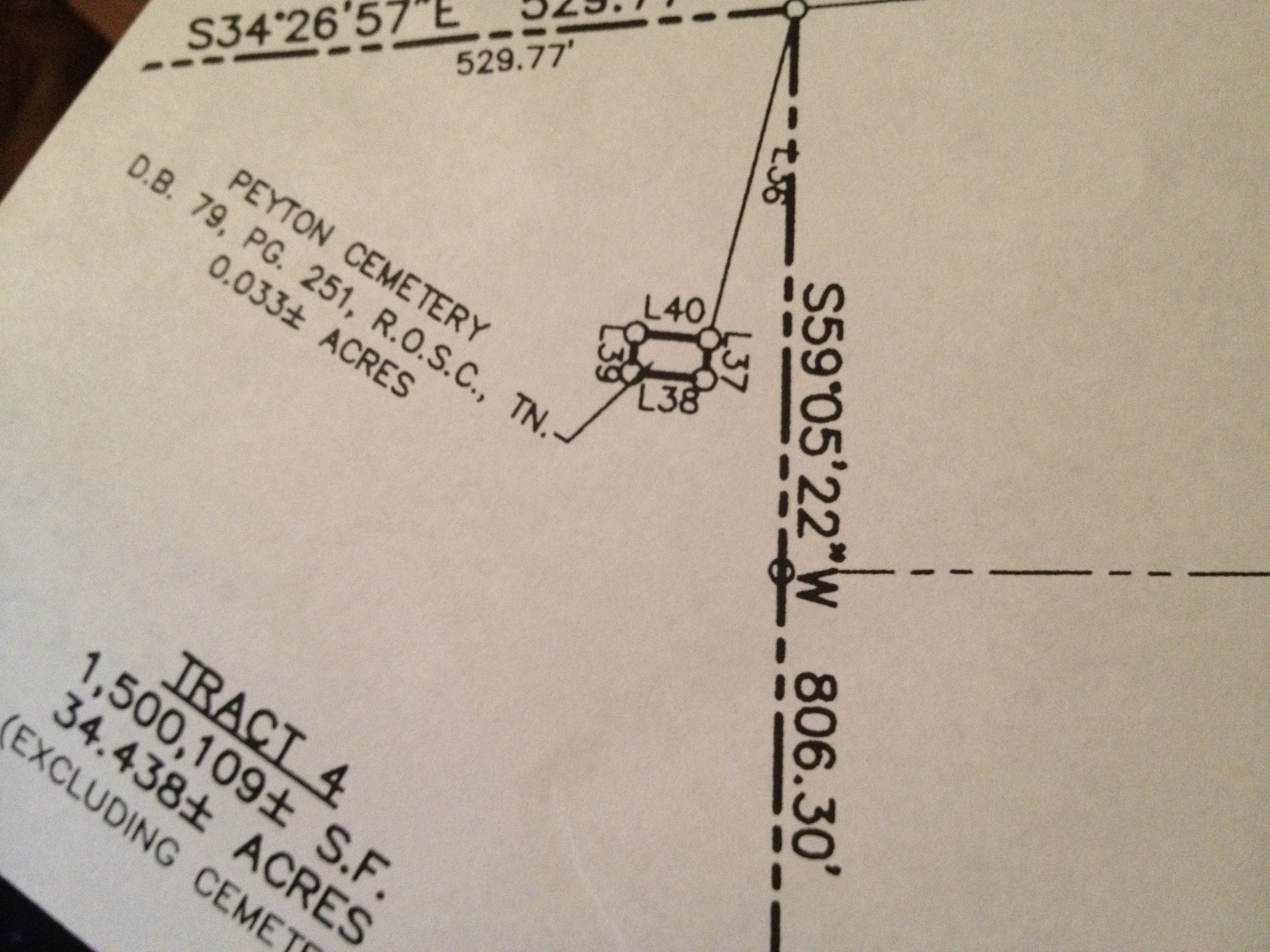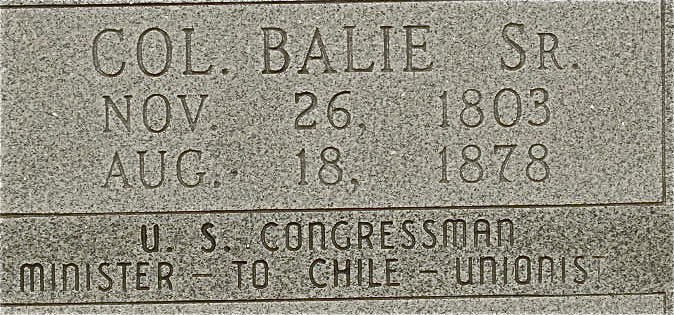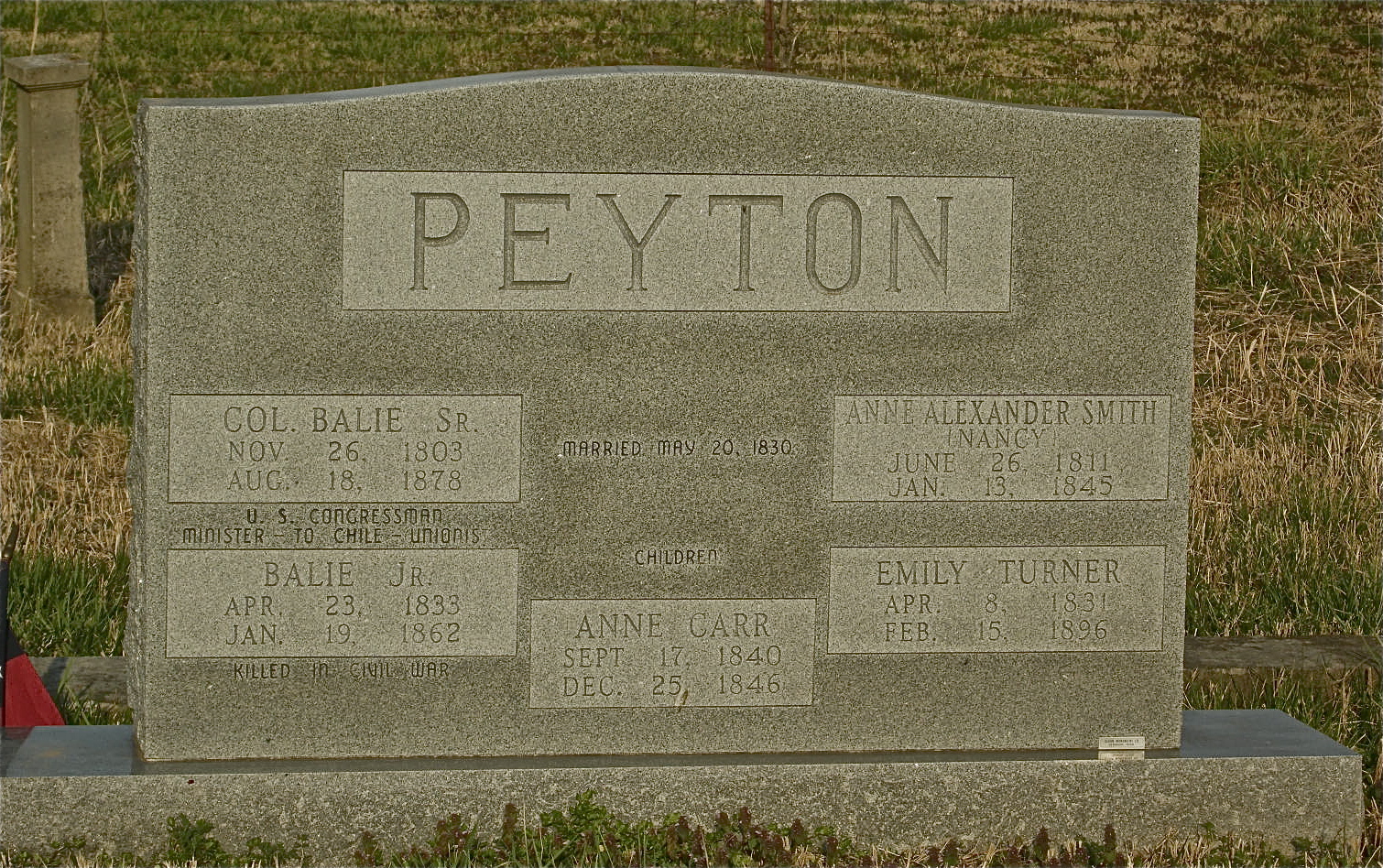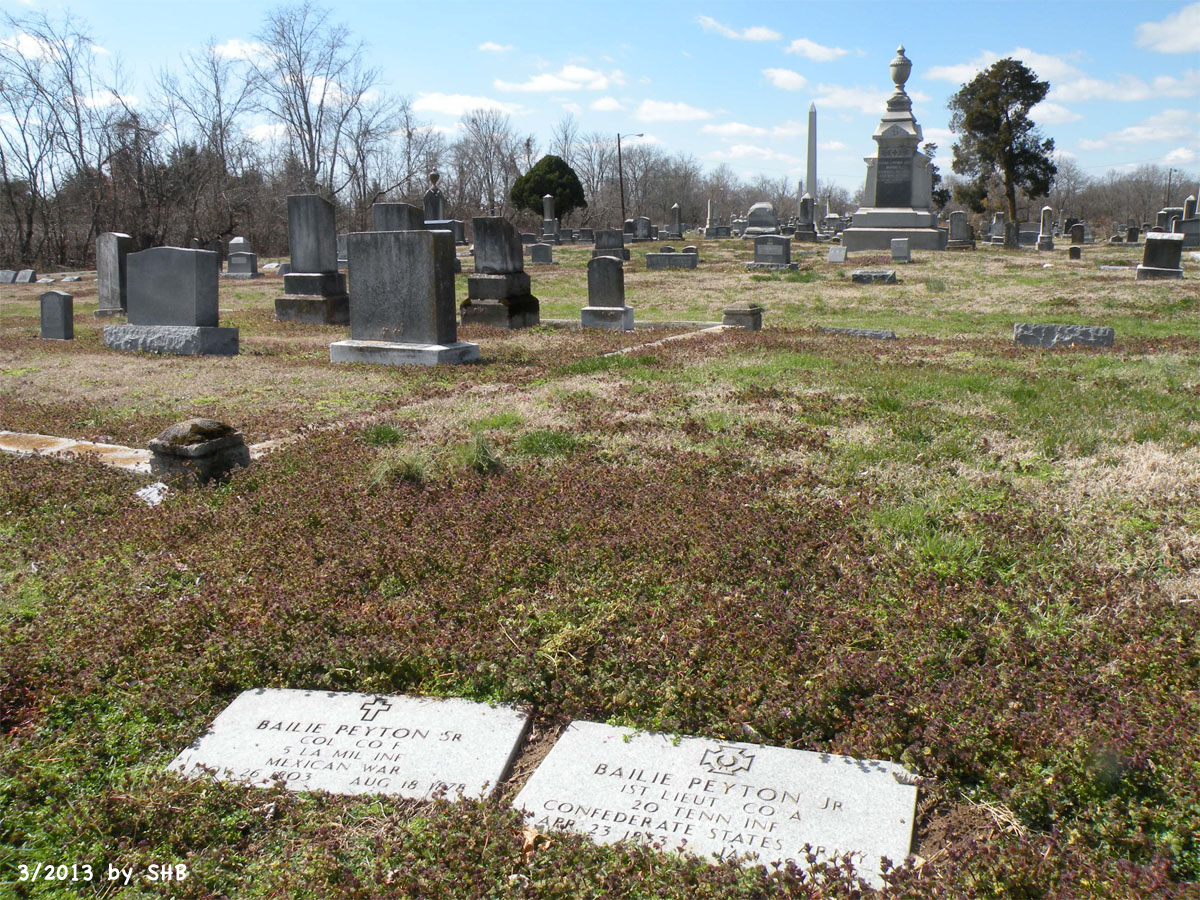ATTORNEY
CONGRESSMAN
MILITARY LEADER
AMBASSADOR
RACE HORSE BREEDER
TENNESSEE ATTORNEY
TENNESSEE CONGRESSMAN, 1833 -1837
PROMINENT WHIG PARTY LEADER
U. S. ATTORNEY , EAST LOUISIANA DIST., 1841 - 1845
COLONEL, 5TH LOUISIANA INFANTRY MILITIA
VETERAN, MEXICAN WAR, 1846 - 1848
ADC TO GENERAL WILLIAM J. WORTH
U. S. MINISTER TO CHILE, 1849 - 1853
ATTORNEY, POLITICAL LEADER, CALIFORNIA, 1853-1859
PROSECUTING ATTORNEY, CITY OF SAN FRANCISCO, 1853 -1859
FOUNDER, CONSTITUTIONAL UNION PARTY, 1860
TENNESSEE UNIONIST, 1861-1865
STATE SENATOR, TENNESSEE 1869-1871
FAMED RACEHORSE BREEDER AND RACER
FOUNDER " PEYTON STAKE" FUTURITY RACE
++++++++++++++++++++++++++++
WIKIPEDIA
BALIE PEYTON
Balie Peyton ( November 26, 1803 - August 18, 1878 ). was an American lawyer and politician who represented Tennessee's 6th congressional district in the United States House of Representatives.
BIOGRAPHY :
Peyton was born near Gallatin , Tennessee on November 26, 1803. After his preparatory studies, he studies law, was admitted to the bar , and commenced practicing in Gallatin in 1824. He married Anne Alexander Smith.
CAREER :
Elected as a Jacksonian to the Twenty-third Congress and re-elected as a Hugh Lawson White Anti-Jacksonian supporter to the Twenty-fourth Congress, Peyton served from March 4, 1833 to March 3, 1837.
Peyton moved to New Orleans in 1841, having been appointed the U. S. Attorney for the District of Louisiana, a position he held for four years from 1841 to 1845. Family life for Peyton was shattered by the fatal illness of his thirty-four-year-old wife in New Orleans in 1845. Two years later , his youngest daughter , " Nan ", died at age seven when thrown from her pony. His oldest child and daughter , Emily, cared for her father from the time her mother died until Balie's death. She never married.
Nationally known for the fine racehorses bred on his farm, Peyton had promoted and staged the Peyton Stake, a futurity race for colts and fillies dropped in the spring of 1839. Held at Nashville in 1843, the race attracted international attention because its purse was the largest that had ever been offered in America or Europe.
Peyton then served as an aide-de-camp on the staff of General William J. Worth during the Mexican-American War.
Peyton was appointed as Envoy to Chile by President Zachary Taylor, from August 9, 1849 to September 14, 1853, when he resigned. He moved to California, where he was the prosecuting Attorney for San Francisco from 1853 to 1859.
Returning to Gallatin in 1859 and practicing law, Peyton resided on his Station Camp Creek farm. One of his first visits to Nashville in 1862 was to the Louisville and Nashville railroad station to receive the mortal remains of his son, Balie Jr. , a Confederate infantry officer killed in the Battle of Mill Springs in Kentucky. He was a presidential elector on the Constitutional Union ticket of John Bell and Edward Everett in 1860. In 1866 , he was an unsuccessful candidate to the Fortieth Congress. He was a member of the Tennessee Senate between 1869 and 1871.
DEATH:
Peyton again resumed practicing law before dying on his farm near Gallatin on August 18, 1878 ( age 74 years, 265 days ). He is interred at the family burying ground on his estate. He was the brother of U. S. Representative Joseph Hopkins Peyton.
++++++++++++++++++++++++++++++++
APPLETON'S ENCYCLOPEDIA
BALIE PEYTON
PEYTON, Balie, congressman, born in Sumner county, Tennessee, 26 November 1803 ; died in Gallatin, Tennessee, 19 August, 1878. He was educated at a private school, adopted the profession of law, was a representative to Congress in 1833-7, having been elected as a Whig, and in 1837 removed to Louisiana, where he was United States district attorney. In 1841 he declined the secretaryship of war. During the Mexican War he served on the staff of General William J. Worth. He was United States minister to Chile in 1849-53, and subsequently went to California, in which state he resumed practice, he returned to Tennessee in 1859, was a presidential elector in 1860 on the Bell-Everett ticket, and was an ardent Unionist, throughout the war consistently throwing his influence on the national side. He resumed his profession in 1865, served in the state senate, and was an unsuccessful candidate for congress. His brother , Joseph H., was a member of congress in 1843-45.
+++++++++++++++++++++++++++++++++
BIOGRAPHICAL DICTIONARY OF THE UNITED STATES CONGRESS
PEYTON, Balie ( 1803 - 1878 )
PEYTON, BALIE, ( brother of Joseph Hopkins Peyton ), a Representative from Tennessee ; born near Gallatin, Tennessee., November 26, 1803 ; completed preparatory studies ; studied law ; was admitted to the bar and commenced practice in Gallatin in 1824 ; elected as a Jacksonian to the Twenty-third Congress and reelected as as Anti-Jacksonian to the Twenty-fourth Congress (.March 4, 1833 - March 3, 1837 ); resumed the practice of law ; moved to New Orleans in 1841, having been appointed United States attorney for the eastern district of Louisiana, which position he held for four years ; served as aide-de-camp on the staff of General W. J. Worth during the Mexican War ; appointed as Minister to Chile by President Taylor and served from August 9, 1849, to September 14, 1853, when he resigned ; moved to San Francisco, Calif., in 1853 and continued the practice of law ; prosecuting attorney of San Francisco 1853-1859 ; returned to Gallatin, Tennessee., in 1859 and resumed the practice of law ; presidential elector on the Constitutional Union ticket of Bell and Everett in 1860 ; unsuccessful candidate for election in 1866 to the Fortieth congress ; member of the state senate, 1869 - 1871; resumed the practice of law ; died on his farm near Gallatin, Sumner County, Tennessee., August 18, 1878 ; interment in the family burying ground on the estate.
++++++++++++++++++++++++++++++++
TENNESSEE ENCYCLOPEDIA
BALIE PEYTON
( 1803 - 1878 )
Balie Peyton , born near Gallatin, Tennessee, was an attorney and colorful political figure whose career included public service in Tennessee, Washington D. C. , Louisiana, Chile, and California. Throughout most of his adult life, he also conducted a breeding operation for thoroughbred race horses on his Station Camp Creek farm in Sumner County.
Elected in 1832 to the House of Representatives of the Twenty-third Congress as a Jacksonian, Peyton afterward bolted the president's party but won reelection. He was one of the founders of the Whig Party in Tennessee.
In 1837, Peyton moved his family to New Orleans, where he practiced law and participated in Whig politics. he worked vigorously on William Henry Harrison's successful campaign for president in 1840. When Harrison died four weeks after his inauguration, President John Tyler appointed Peyton to a four year term as U. S. Attorney for the Eastern District of Louisiana. During the mid 1840s, Peyton was frequently mentioned for cabinet level appointments. jacksonians expected he would be appointed U. S. Attorney General by President Tyler ; others regarded him as fit for various high level offices. The offer that materialized was for secretary of war, and he declined it.
On the day before Congress declared war on Mexico, Peyton volunteered in New Orleans as a private in the ranks, and within a few days he was promoted to colonel. Ordered by General Edmund P. Gaines to recruit a regiment of six -month volunteers, Peyton mustered ten companies into the service of the United States on May 22. Once in Mexico, Peyton volunteered as aide-de-camp for General Zachary Taylor. Later, he transferred to the staff of General William J. Worth in time to be commended for his participation in the Battle of Monterrey.
Confident that Taylor , a war hero and Louisianan , would be the Whig nominee for president, Peyton promoted his candidacy. trailer wanted to campaign independent of any political party , but Peyton maneuvered the general into abandoning. a non-partisan race and acknowledging that he was a Whig. With Taylor's election in 1848, Peyton was appointed minister to Chile, He completed a relatively uneventful four- year term there before going to San Francisco in 1853 at the mid-term of the California gold rush.
Opening a law office in San Francisco, peyton soon became an acknowledged leader in the political life of the city. he was a leading conciliator in defusing a deadly hostility that developed between two opposing citizen groups, reformers known as the Vigilance Committee of 1856 and a smaller status quo group known as Law and Order. At a critical moment, Peyton successfully assured the governor of California of the imminent dissolution of the Vigilance Committee and persuaded him to desist from his plans to declare martial law in the city. A few days later, the committee publicly disbanded.
As the national Whig Party faded from the scene, Peyton joined the American Party and in 1856 was state-at-large elector for the Fillmore-Donelson ticket. He regarded his efforts as an attempt to save the Union.
pewyton returned to Tennessee in 1859. a driving in New York on November 27, he continued to Philadelphia where a cousin persuaded him to join in forming a national union party. Several weeks later, Peyton launched the Constitutional Union Party in a speech at Philadelphia, portraying the new party as an alternative to sectional parties that threatened to destroy the Union. Their effort was too late. The party's presidential ticket, John Bell of Tennessee and Edward Everett of Massachusetts, carried only three states, Kentucky, Tennessee, and Virginia.
During the years 1861-65, Peyton resided on his Station Camp Creek farm. One of his first visits to Nashville in 1862 was to the Louisville and Nashville Railroad station to receive the mortal remains of his son, Balie Jr., a Confederate infantry officer killed in the Battle of Mill Springs, Kentucky.
Peyton was a confidant of Military Governor Andrew Johnson until 1864, when Tennessee Unionists split into radical and conservative factions. As a Conservative Unionist, he opposed Johnson's successful attempt to control the vote in the Tennessee presidential election of 1864. Peyton's only election to public office after the war was to a seat in the State Senate for a single term ( 1869-71 ).
Throughout his career , Peyton was a political ally of many , but especially of Congressman William Bowen Campbell and John Bell of Tennessee, Senators Henry Wise of Virginia, Alexander Barrow of Louisiana, Henry Clay and John J. Crittenden of Kentucky and William H. Polk, the president's brother.
Balie was the inspiration for his brother, Joseph Hopkins Peyton , who campaigned successfully as a Whig for the Tennessee State Senate in 1840. Two years later, voters elected him to a second term. Death overtook him on November 11, 1845 , before the Twenty-ninth Congress convened on December 1.
Nationally known for the fine racehorses bred on his farm, Peyton had promoted and staged the Peyton Stake, a futurity race for colts and fillies dropped in the spring of 1839. Held at Nashville in 1843, the race attracted international attention because the purse was the largest that had ever been offered in America or Europe.
Prior to the death of Balie Jr. in the Civil War , family life for Peyton was shattered by the fatal illness of his thirty-four-year-old wife Anne Alexander Sm with Peyton in New Orleans in 1845. Two years later, his youngest daughter " Nan ". died at age seven when thrown from her pony. His oldest child and daughter, Emily , cared for her father from the time her mother died until Balie's death. She never married. Balie was pleased when his son John Bell Peyton married Francis Trousdale, daughter of Governor William Trousdale, in 1861. Balie Peyton died in 1878. John Bell died in 1914.
+++++++++++++++++++++++++++++++++++
TENNESSEE ENCYCLOPEDIA
EARLY HORSE RACING TRACKS
......... From 1828 to 1886 the Nashville racetrack, known as the Burns Island track, was located near Second Avenue North and Van Buren along the Cumberland River. On October 16, 1843, the PEYTON STAKES, sponsored by BALIE PEYTON, was run at this track. With a purse of thirty five thousand dollars, the PEYTON STAKES was the richest race run anywhere in the world to that point. The winner, Peytona, was owned by Thomas Kirkman of Nashville. The Burns Island track and horse racing survived the Civil War, but since the track flooded periodically, it was replaced by West Side Park in 1887
++++++++++++++++++++++++++++++++++
THE MEXICAN WAR DIARY AND CORRESPONDENCE OF
GEORGE B. MC CLELLAN
page 37
DIARY ENTRY
Brazos Santiago, Texas
14 October 1846
" We have been here since Monday afternoon ( 10 October ), and it is now Friday ( 14 October ). We expect to march for the mouth of the Rio Grande tomorrow morning at break of day. We received when we arrive the news of the Battle of Monterrey. Three officers who were present dined with us today --- Nichols of the 2nd Artillery, Captain Smith ( brother of G. W. Smith ) formerly Captain of Louisiana Volunteers , now an amateur, Captain Crump of the Mississippi Volunteers --- fine fellows all. Saw BAILIE PEYTON and some others pass our encampment this morning from Monterrey.
++++++++++++++++++++++++++++++
ALEXANDRIA GAZETTE
February 9, 1848
FRACAS IN NEW ORLEANS
In Saturday's Enquirer we find an extract from a Card. in the New Orleans Delta, giving an account by A. Walker , one of the editor's of that paper, of an assault committed upon him by Col. Balie Peyton, in which the latter gentleman is represented as having deported himself in an assassin-like and cowardly manner. Mr. Walker also states that Col. Peyton only escaped "the chastisement he merited ," by being rescued by two of his friends. This is one side of the story. Now, let us hear the other, which we copy from the Picayune : RICHMOND WHIG
TO THE PUBLIC. --- It is scarcely necessary for me to notice a card published in the Delta this morning by A. Walker, one of the Editors of that paper, further than to say that its statements respecting what occurred when I met him yesterday, are as destitute of truth as his article in regard to myself, a few days before, was of decency.
It is true that when I met him in Chatres Street I boxed his jaws soundly , and expressed my opinion to him, in. no doubtful terms his veracity and courage. He has chosen to resent this chastisement by a card in the paper over which he presides, and if he can find consolation in this mode of redress, I am glad that it is so, for at the time I boxed his face, his only defense was a reiterated apology --- though , as I learn, he became more salient after I left him. There were several gentlemen present, who will state that when he was slapped and denounced as a har and coward, his only resistance was an humble disclaimer of having designed to affront me.
BALIE PEYTON
+++++++++++++++++++++++++++++++
Researched and transcribed by :
ED CATTERSON
12/22/21
ATTORNEY
CONGRESSMAN
MILITARY LEADER
AMBASSADOR
RACE HORSE BREEDER
TENNESSEE ATTORNEY
TENNESSEE CONGRESSMAN, 1833 -1837
PROMINENT WHIG PARTY LEADER
U. S. ATTORNEY , EAST LOUISIANA DIST., 1841 - 1845
COLONEL, 5TH LOUISIANA INFANTRY MILITIA
VETERAN, MEXICAN WAR, 1846 - 1848
ADC TO GENERAL WILLIAM J. WORTH
U. S. MINISTER TO CHILE, 1849 - 1853
ATTORNEY, POLITICAL LEADER, CALIFORNIA, 1853-1859
PROSECUTING ATTORNEY, CITY OF SAN FRANCISCO, 1853 -1859
FOUNDER, CONSTITUTIONAL UNION PARTY, 1860
TENNESSEE UNIONIST, 1861-1865
STATE SENATOR, TENNESSEE 1869-1871
FAMED RACEHORSE BREEDER AND RACER
FOUNDER " PEYTON STAKE" FUTURITY RACE
++++++++++++++++++++++++++++
WIKIPEDIA
BALIE PEYTON
Balie Peyton ( November 26, 1803 - August 18, 1878 ). was an American lawyer and politician who represented Tennessee's 6th congressional district in the United States House of Representatives.
BIOGRAPHY :
Peyton was born near Gallatin , Tennessee on November 26, 1803. After his preparatory studies, he studies law, was admitted to the bar , and commenced practicing in Gallatin in 1824. He married Anne Alexander Smith.
CAREER :
Elected as a Jacksonian to the Twenty-third Congress and re-elected as a Hugh Lawson White Anti-Jacksonian supporter to the Twenty-fourth Congress, Peyton served from March 4, 1833 to March 3, 1837.
Peyton moved to New Orleans in 1841, having been appointed the U. S. Attorney for the District of Louisiana, a position he held for four years from 1841 to 1845. Family life for Peyton was shattered by the fatal illness of his thirty-four-year-old wife in New Orleans in 1845. Two years later , his youngest daughter , " Nan ", died at age seven when thrown from her pony. His oldest child and daughter , Emily, cared for her father from the time her mother died until Balie's death. She never married.
Nationally known for the fine racehorses bred on his farm, Peyton had promoted and staged the Peyton Stake, a futurity race for colts and fillies dropped in the spring of 1839. Held at Nashville in 1843, the race attracted international attention because its purse was the largest that had ever been offered in America or Europe.
Peyton then served as an aide-de-camp on the staff of General William J. Worth during the Mexican-American War.
Peyton was appointed as Envoy to Chile by President Zachary Taylor, from August 9, 1849 to September 14, 1853, when he resigned. He moved to California, where he was the prosecuting Attorney for San Francisco from 1853 to 1859.
Returning to Gallatin in 1859 and practicing law, Peyton resided on his Station Camp Creek farm. One of his first visits to Nashville in 1862 was to the Louisville and Nashville railroad station to receive the mortal remains of his son, Balie Jr. , a Confederate infantry officer killed in the Battle of Mill Springs in Kentucky. He was a presidential elector on the Constitutional Union ticket of John Bell and Edward Everett in 1860. In 1866 , he was an unsuccessful candidate to the Fortieth Congress. He was a member of the Tennessee Senate between 1869 and 1871.
DEATH:
Peyton again resumed practicing law before dying on his farm near Gallatin on August 18, 1878 ( age 74 years, 265 days ). He is interred at the family burying ground on his estate. He was the brother of U. S. Representative Joseph Hopkins Peyton.
++++++++++++++++++++++++++++++++
APPLETON'S ENCYCLOPEDIA
BALIE PEYTON
PEYTON, Balie, congressman, born in Sumner county, Tennessee, 26 November 1803 ; died in Gallatin, Tennessee, 19 August, 1878. He was educated at a private school, adopted the profession of law, was a representative to Congress in 1833-7, having been elected as a Whig, and in 1837 removed to Louisiana, where he was United States district attorney. In 1841 he declined the secretaryship of war. During the Mexican War he served on the staff of General William J. Worth. He was United States minister to Chile in 1849-53, and subsequently went to California, in which state he resumed practice, he returned to Tennessee in 1859, was a presidential elector in 1860 on the Bell-Everett ticket, and was an ardent Unionist, throughout the war consistently throwing his influence on the national side. He resumed his profession in 1865, served in the state senate, and was an unsuccessful candidate for congress. His brother , Joseph H., was a member of congress in 1843-45.
+++++++++++++++++++++++++++++++++
BIOGRAPHICAL DICTIONARY OF THE UNITED STATES CONGRESS
PEYTON, Balie ( 1803 - 1878 )
PEYTON, BALIE, ( brother of Joseph Hopkins Peyton ), a Representative from Tennessee ; born near Gallatin, Tennessee., November 26, 1803 ; completed preparatory studies ; studied law ; was admitted to the bar and commenced practice in Gallatin in 1824 ; elected as a Jacksonian to the Twenty-third Congress and reelected as as Anti-Jacksonian to the Twenty-fourth Congress (.March 4, 1833 - March 3, 1837 ); resumed the practice of law ; moved to New Orleans in 1841, having been appointed United States attorney for the eastern district of Louisiana, which position he held for four years ; served as aide-de-camp on the staff of General W. J. Worth during the Mexican War ; appointed as Minister to Chile by President Taylor and served from August 9, 1849, to September 14, 1853, when he resigned ; moved to San Francisco, Calif., in 1853 and continued the practice of law ; prosecuting attorney of San Francisco 1853-1859 ; returned to Gallatin, Tennessee., in 1859 and resumed the practice of law ; presidential elector on the Constitutional Union ticket of Bell and Everett in 1860 ; unsuccessful candidate for election in 1866 to the Fortieth congress ; member of the state senate, 1869 - 1871; resumed the practice of law ; died on his farm near Gallatin, Sumner County, Tennessee., August 18, 1878 ; interment in the family burying ground on the estate.
++++++++++++++++++++++++++++++++
TENNESSEE ENCYCLOPEDIA
BALIE PEYTON
( 1803 - 1878 )
Balie Peyton , born near Gallatin, Tennessee, was an attorney and colorful political figure whose career included public service in Tennessee, Washington D. C. , Louisiana, Chile, and California. Throughout most of his adult life, he also conducted a breeding operation for thoroughbred race horses on his Station Camp Creek farm in Sumner County.
Elected in 1832 to the House of Representatives of the Twenty-third Congress as a Jacksonian, Peyton afterward bolted the president's party but won reelection. He was one of the founders of the Whig Party in Tennessee.
In 1837, Peyton moved his family to New Orleans, where he practiced law and participated in Whig politics. he worked vigorously on William Henry Harrison's successful campaign for president in 1840. When Harrison died four weeks after his inauguration, President John Tyler appointed Peyton to a four year term as U. S. Attorney for the Eastern District of Louisiana. During the mid 1840s, Peyton was frequently mentioned for cabinet level appointments. jacksonians expected he would be appointed U. S. Attorney General by President Tyler ; others regarded him as fit for various high level offices. The offer that materialized was for secretary of war, and he declined it.
On the day before Congress declared war on Mexico, Peyton volunteered in New Orleans as a private in the ranks, and within a few days he was promoted to colonel. Ordered by General Edmund P. Gaines to recruit a regiment of six -month volunteers, Peyton mustered ten companies into the service of the United States on May 22. Once in Mexico, Peyton volunteered as aide-de-camp for General Zachary Taylor. Later, he transferred to the staff of General William J. Worth in time to be commended for his participation in the Battle of Monterrey.
Confident that Taylor , a war hero and Louisianan , would be the Whig nominee for president, Peyton promoted his candidacy. trailer wanted to campaign independent of any political party , but Peyton maneuvered the general into abandoning. a non-partisan race and acknowledging that he was a Whig. With Taylor's election in 1848, Peyton was appointed minister to Chile, He completed a relatively uneventful four- year term there before going to San Francisco in 1853 at the mid-term of the California gold rush.
Opening a law office in San Francisco, peyton soon became an acknowledged leader in the political life of the city. he was a leading conciliator in defusing a deadly hostility that developed between two opposing citizen groups, reformers known as the Vigilance Committee of 1856 and a smaller status quo group known as Law and Order. At a critical moment, Peyton successfully assured the governor of California of the imminent dissolution of the Vigilance Committee and persuaded him to desist from his plans to declare martial law in the city. A few days later, the committee publicly disbanded.
As the national Whig Party faded from the scene, Peyton joined the American Party and in 1856 was state-at-large elector for the Fillmore-Donelson ticket. He regarded his efforts as an attempt to save the Union.
pewyton returned to Tennessee in 1859. a driving in New York on November 27, he continued to Philadelphia where a cousin persuaded him to join in forming a national union party. Several weeks later, Peyton launched the Constitutional Union Party in a speech at Philadelphia, portraying the new party as an alternative to sectional parties that threatened to destroy the Union. Their effort was too late. The party's presidential ticket, John Bell of Tennessee and Edward Everett of Massachusetts, carried only three states, Kentucky, Tennessee, and Virginia.
During the years 1861-65, Peyton resided on his Station Camp Creek farm. One of his first visits to Nashville in 1862 was to the Louisville and Nashville Railroad station to receive the mortal remains of his son, Balie Jr., a Confederate infantry officer killed in the Battle of Mill Springs, Kentucky.
Peyton was a confidant of Military Governor Andrew Johnson until 1864, when Tennessee Unionists split into radical and conservative factions. As a Conservative Unionist, he opposed Johnson's successful attempt to control the vote in the Tennessee presidential election of 1864. Peyton's only election to public office after the war was to a seat in the State Senate for a single term ( 1869-71 ).
Throughout his career , Peyton was a political ally of many , but especially of Congressman William Bowen Campbell and John Bell of Tennessee, Senators Henry Wise of Virginia, Alexander Barrow of Louisiana, Henry Clay and John J. Crittenden of Kentucky and William H. Polk, the president's brother.
Balie was the inspiration for his brother, Joseph Hopkins Peyton , who campaigned successfully as a Whig for the Tennessee State Senate in 1840. Two years later, voters elected him to a second term. Death overtook him on November 11, 1845 , before the Twenty-ninth Congress convened on December 1.
Nationally known for the fine racehorses bred on his farm, Peyton had promoted and staged the Peyton Stake, a futurity race for colts and fillies dropped in the spring of 1839. Held at Nashville in 1843, the race attracted international attention because the purse was the largest that had ever been offered in America or Europe.
Prior to the death of Balie Jr. in the Civil War , family life for Peyton was shattered by the fatal illness of his thirty-four-year-old wife Anne Alexander Sm with Peyton in New Orleans in 1845. Two years later, his youngest daughter " Nan ". died at age seven when thrown from her pony. His oldest child and daughter, Emily , cared for her father from the time her mother died until Balie's death. She never married. Balie was pleased when his son John Bell Peyton married Francis Trousdale, daughter of Governor William Trousdale, in 1861. Balie Peyton died in 1878. John Bell died in 1914.
+++++++++++++++++++++++++++++++++++
TENNESSEE ENCYCLOPEDIA
EARLY HORSE RACING TRACKS
......... From 1828 to 1886 the Nashville racetrack, known as the Burns Island track, was located near Second Avenue North and Van Buren along the Cumberland River. On October 16, 1843, the PEYTON STAKES, sponsored by BALIE PEYTON, was run at this track. With a purse of thirty five thousand dollars, the PEYTON STAKES was the richest race run anywhere in the world to that point. The winner, Peytona, was owned by Thomas Kirkman of Nashville. The Burns Island track and horse racing survived the Civil War, but since the track flooded periodically, it was replaced by West Side Park in 1887
++++++++++++++++++++++++++++++++++
THE MEXICAN WAR DIARY AND CORRESPONDENCE OF
GEORGE B. MC CLELLAN
page 37
DIARY ENTRY
Brazos Santiago, Texas
14 October 1846
" We have been here since Monday afternoon ( 10 October ), and it is now Friday ( 14 October ). We expect to march for the mouth of the Rio Grande tomorrow morning at break of day. We received when we arrive the news of the Battle of Monterrey. Three officers who were present dined with us today --- Nichols of the 2nd Artillery, Captain Smith ( brother of G. W. Smith ) formerly Captain of Louisiana Volunteers , now an amateur, Captain Crump of the Mississippi Volunteers --- fine fellows all. Saw BAILIE PEYTON and some others pass our encampment this morning from Monterrey.
++++++++++++++++++++++++++++++
ALEXANDRIA GAZETTE
February 9, 1848
FRACAS IN NEW ORLEANS
In Saturday's Enquirer we find an extract from a Card. in the New Orleans Delta, giving an account by A. Walker , one of the editor's of that paper, of an assault committed upon him by Col. Balie Peyton, in which the latter gentleman is represented as having deported himself in an assassin-like and cowardly manner. Mr. Walker also states that Col. Peyton only escaped "the chastisement he merited ," by being rescued by two of his friends. This is one side of the story. Now, let us hear the other, which we copy from the Picayune : RICHMOND WHIG
TO THE PUBLIC. --- It is scarcely necessary for me to notice a card published in the Delta this morning by A. Walker, one of the Editors of that paper, further than to say that its statements respecting what occurred when I met him yesterday, are as destitute of truth as his article in regard to myself, a few days before, was of decency.
It is true that when I met him in Chatres Street I boxed his jaws soundly , and expressed my opinion to him, in. no doubtful terms his veracity and courage. He has chosen to resent this chastisement by a card in the paper over which he presides, and if he can find consolation in this mode of redress, I am glad that it is so, for at the time I boxed his face, his only defense was a reiterated apology --- though , as I learn, he became more salient after I left him. There were several gentlemen present, who will state that when he was slapped and denounced as a har and coward, his only resistance was an humble disclaimer of having designed to affront me.
BALIE PEYTON
+++++++++++++++++++++++++++++++
Researched and transcribed by :
ED CATTERSON
12/22/21
Family Members
Advertisement
Explore more
Sponsored by Ancestry
Advertisement
